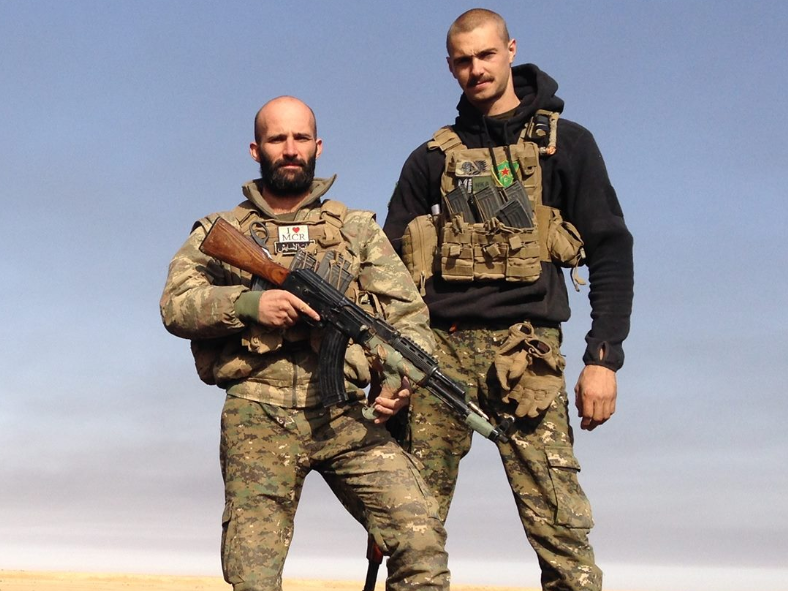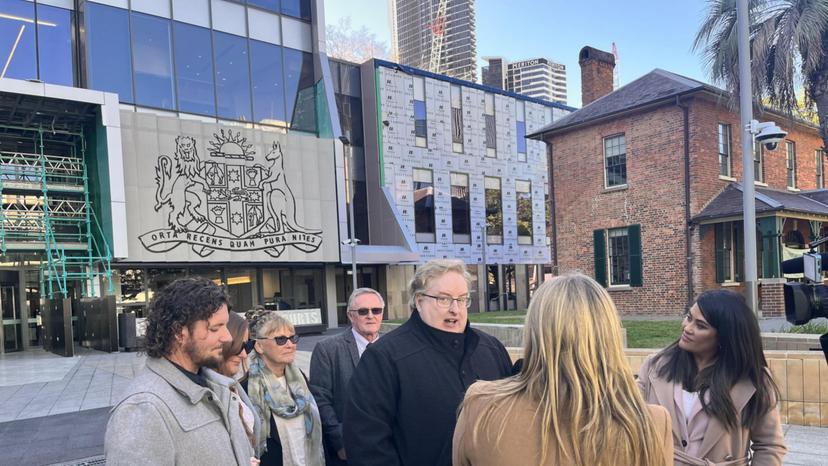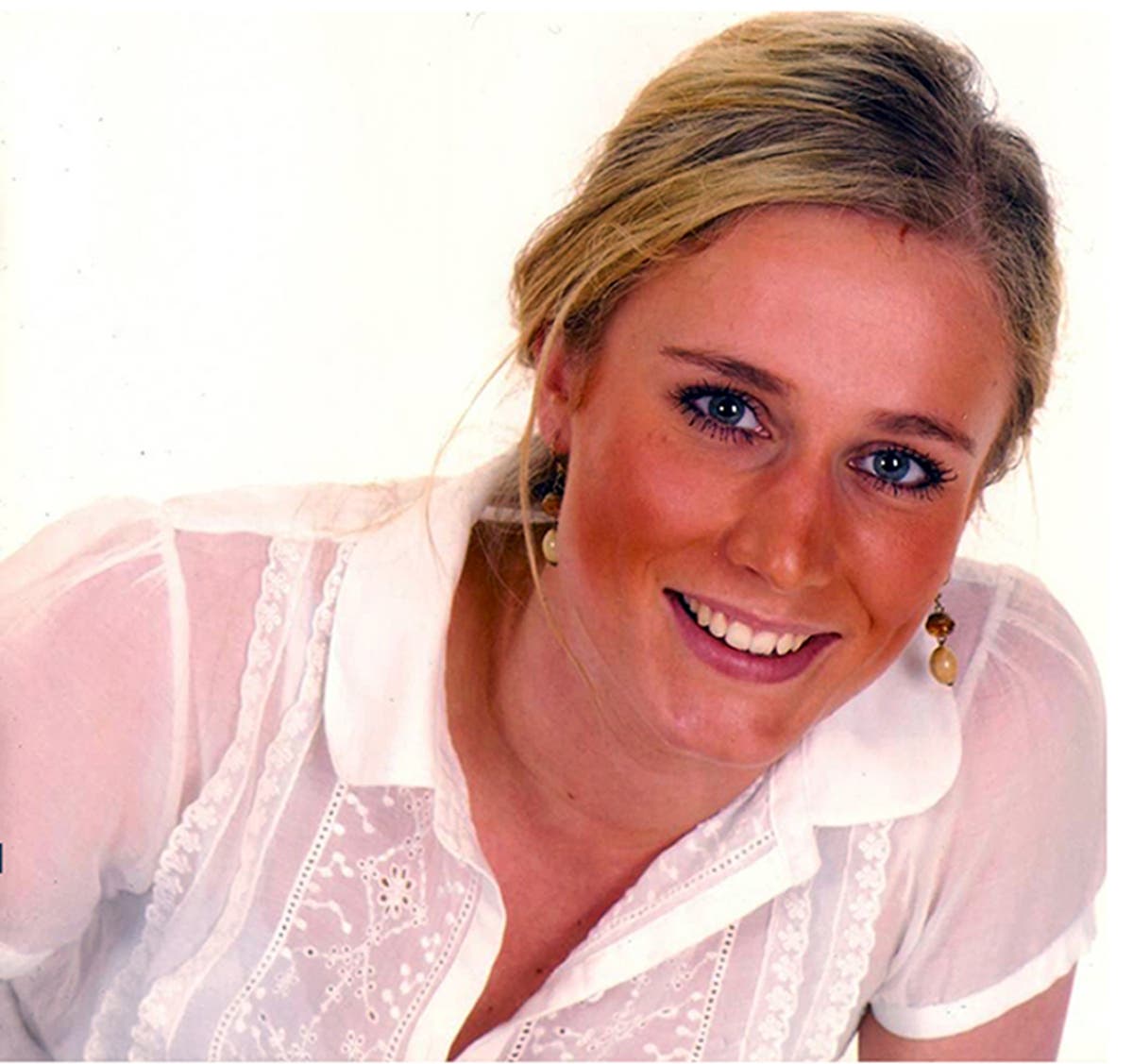The Independent employs reporters around the world to bring you truly independent journalism. To support us, please consider a contribution.
“One minute my son was being given an iPad and weapons by the government, then he’s being classed as a terrorist,” says Paul Newey. “It’s completely surreal.”
The 49-year-old engineer’s son, Daniel Newey, is among dozens of British volunteers who joined the Kurdish People’s Protection Units (YPG) in Syria.
They were backed by the UK and other members of the US-led international coalition to fight Isis after its 2014 insurgency.
Download the new Independent Premium app Sharing the full story, not just the headlines
The YPG was praised by ministers for driving the terrorist group out of northern Syria last year, but the victory was swiftly followed by a Turkish invasion.
Turkey regards the YPG as a terrorist group and although the UK does not, several volunteers have faced terror charges for fighting or training with it.
Daniel Newey remains in Syria, but his father and brother were charged with terror offences in December.
Paul Newey was accused of funding terrorism by sending £150 to his son, while his 19-year-old son Sam was accused of assisting his brother.
They were due to go on trial in October alongside Daniel Burke, a former paratrooper who originally fought against Isis with YPG between late 2017 and June 2018.
No action was taken at the time, but he was prosecuted for “preparing acts of terrorism” after allegedly attempting to return to support the YPG against an invasion by Turkish-led forces last year.
Last week, the Crown Prosecution Service (CPS) announced it would offer no evidence against the three men. It said there was no longer a “reasonable prospect of conviction”, but no further explanation has been given.
Daily coronavirus briefing No hype, just the advice and analysis you need Enter your email address Continue Continue Please enter an email address Email address is invalid Fill out this field Email address is invalid Email already exists. Log in to update your newsletter preferences Register with your social account or click here to log in I would like to receive morning headlines Monday – Friday plus breaking news alerts by email Update newsletter preferences
Paul Newey said the case has put his family’s life “in limbo”, and affected their jobs and personal lives.
Shape Created with Sketch. Turkey launches offensive into Syria Show all 25 left Created with Sketch. right Created with Sketch. Shape Created with Sketch. Turkey launches offensive into Syria 1/25 Turkish soldiers with armored vehicles EPA 2/25 A woman flees with her children during Turkish bombardment on Syria’s northeastern town of Ras al-Ain AFP/Getty 3/25 AFP/Getty 4/25 The first group of Turkish infantry prepare to enter Syria on the border Getty 5/25 Civilians flee AFP/Getty 6/25 Smoke billows from targets inside Syria AP 7/25 Turkish armoured vehicles enter Syria in Akcakale Getty 8/25 Civilians leave as smoke rises from Ras al-Ain AFP 9/25 A multi-rocket launcher fires in an unknown location Turkish Defence Ministry via Reuters 10/25 People wave as Turkish soldiers prepare to cross the border Getty 11/25 Girls stand together in Ras al Ain town Reuters 12/25 A woman walks as smoke billows following Turkish bombardment in Syria’s northeastern town of Ras al-Ain AFP/Getty 13/25 A Turkish army’s tank drives down from a truck towards the border with Syria AFP/Getty 14/25 Turkish jet taxis on tarmac after returning to a military base in southeast Diyarbakir Reuters 15/25 A Turkish armored vehicle drives down a road during a military operation in Kurdish areas of northern Syria EPA 16/25 People sit on belongings at a back of a truck as they flee Ras al Ain town Reuters 17/25 Turkey-backed Syrian opposition fighters enter Tel Abyad AFP/Getty 18/25 Civilians flee AFP/Getty 19/25 People flee Tal Abyad North Press Agency/Reuters TV 20/25 People wave as Turkish soldiers prepare to cross the border into Syria Getty 21/25 Civilians flee with their belongings AFP/Getty 22/25 AFP/Getty 23/25 Turkish President Recep Tayyip Erdogan, right, speaks with Defense Minister Hulusi Akar, left, as they watch the operation by Turkish forces in Kurdish areas EPA 24/25 Smoke rises from the Syrian town of Tal Abyad AFP/Getty 25/25 Turkey-backed members of Syrian National Army prepare for moving to Turkey with heavy armed vehicles EPA 1/25 Turkish soldiers with armored vehicles EPA 2/25 A woman flees with her children during Turkish bombardment on Syria’s northeastern town of Ras al-Ain AFP/Getty 3/25 AFP/Getty 4/25 The first group of Turkish infantry prepare to enter Syria on the border Getty 5/25 Civilians flee AFP/Getty 6/25 Smoke billows from targets inside Syria AP 7/25 Turkish armoured vehicles enter Syria in Akcakale Getty 8/25 Civilians leave as smoke rises from Ras al-Ain AFP 9/25 A multi-rocket launcher fires in an unknown location Turkish Defence Ministry via Reuters 10/25 People wave as Turkish soldiers prepare to cross the border Getty 11/25 Girls stand together in Ras al Ain town Reuters 12/25 A woman walks as smoke billows following Turkish bombardment in Syria’s northeastern town of Ras al-Ain AFP/Getty 13/25 A Turkish army’s tank drives down from a truck towards the border with Syria AFP/Getty 14/25 Turkish jet taxis on tarmac after returning to a military base in southeast Diyarbakir Reuters 15/25 A Turkish armored vehicle drives down a road during a military operation in Kurdish areas of northern Syria EPA 16/25 People sit on belongings at a back of a truck as they flee Ras al Ain town Reuters 17/25 Turkey-backed Syrian opposition fighters enter Tel Abyad AFP/Getty 18/25 Civilians flee AFP/Getty 19/25 People flee Tal Abyad North Press Agency/Reuters TV 20/25 People wave as Turkish soldiers prepare to cross the border into Syria Getty 21/25 Civilians flee with their belongings AFP/Getty 22/25 AFP/Getty 23/25 Turkish President Recep Tayyip Erdogan, right, speaks with Defense Minister Hulusi Akar, left, as they watch the operation by Turkish forces in Kurdish areas EPA 24/25 Smoke rises from the Syrian town of Tal Abyad AFP/Getty 25/25 Turkey-backed members of Syrian National Army prepare for moving to Turkey with heavy armed vehicles EPA
He told The Independent that he and his son had been stopped by armed police in September and had “guns pointed at our heads”.
Then when he was arrested on 11 December, he was questioned for three days by counterterror police and someone he believed represented the security services.
Police searched Paul Newey’s home, seized all his electronic devices and questioned a friend who had employed his son.
“It was completely surreal, I’m just a normal chap,” he said. “I hadn’t paid much interest to politics previously because I just thought they were fighting Isis.”
Paul Newey was freed on bail but ordered to sign in at a police station twice a week leading up to a trial originally scheduled for June. But it was delayed until October and he was left in “limbo” until the CPS sent a letter announcing that the case was being dropped, on 29 June.
Now, Mr Newey and his family want to know why the case was brought in the first place, after every other terror prosecution linked to the YPG had failed.
“It just doesn’t add up,” he said. “They’ve been so unsuccessful with all the other prosecution, why haven’t they just given up? Nobody [in the YPG] is going to be a danger to the British public, they’re fighting for a cause they believe in to protect people. How are they terrorists?”
Mr Burke’s legal team said he believed the CPS’s decision to drop the prosecution was directly linked to his application for the prosecution to disclose “information relating to diplomatic pressure placed on the UK government by Turkey to treat the Kurdish YPG as ‘terrorists’”.
A statement said threats about future trade links, and the “unwillingness of the authorities to risk the embarrassment” of revealing communications, may have played a part in the CPS’s decision.
Several former YPG fighters have suggested that political pressure from Turkey could be driving similar prosecutions.
There has been a string of failed or abandoned terror prosecutions of people who fought with the YPG, amid persistent questions over how supporting a group that was backed by the British government against Isis could be terrorism.
Eight British volunteers – seven men and one woman – were killed in action and the UK government has repeatedly praised the YPG’s “important contribution to counter-Daesh efforts”.
It is not classed as a terrorist organisation in the UK, although the linked Kurdistan Workers’ Party (PKK) is.
In previous cases, prosecutors have highlighted the YPG’s left-wing ideals, push for female equality and projects including a “communal lettuce garden” in evidence.
The link between that kind of activity and terror laws relies on the definition of terrorism in British law as violence or threats advancing “a political, religious or ideological cause”.
Numerous MPs opposed the definition when it was proposed, and Kurds were specifically mentioned 13 times in a 1999 House of Commons debate over the new Terrorism Act.
After an MP asked whether supporting Kurdish groups who were then fighting Saddam Hussein’s forces in Iraq would be “capable of constituting terrorism”, the government denied the possibility.
Jack Straw, then Labour’s home secretary, called the idea “hypothetical” and “fantastic”, adding: “I simply do not accept the proposition. The idea that in this country the police would investigate such an alleged offence in respect of Iraq, that the Crown Prosecution Service would bring a charge and that the director of public prosecutions would give his consent cannot exist outside [the questioner’s] fevered imagination.”
Mr Straw claimed the new terror laws would be “subject to a significant series of checks and balances”, adding: “Such circumstances therefore do not arise, and I do not believe that they ever will.”
But at least six people who fought with or supported the Kurdish YPG have now been charged with terror offences.
One former volunteer, Aidan James, was jailed in November for attending a training camp operated by the PKK in Iraq but was acquitted by a jury for the same offence at a YPG camp.
The CPS initially charged him with preparing acts of terrorism by travelling to Syria to join the YPG but a judge found that he had “no case to answer”.
Mr Justice Edis noted the Kurdish group was “supporting the policy of the UK and other allies by fighting Isis” and was backed by RAF airstrikes.
The judge told the Old Bailey last year that fighting alongside the YPG “was not terrorism at all” under current laws.
Another former soldier, James Matthews, saw terror charges against him for attending a YPG camp dropped in July 2018 after a two-year investigation.
Joshua Walker, a student who joined the YPG in 2016, was arrested on his return to Gatwick airport 18 months later. He was not prosecuted for his activities in Syria but instead charged with a terror offence for possessing a copy of The Anarchist Cookbook.
A jury acquitted him after hearing Mr Walker downloaded the document, which contains bomb-making instructions, for a role-playing society at the University of Aberystwyth.
Another former YPG volunteer, who did not want to be named, told The Independent he had left the UK after being “harassed” by security services despite being released with no further action following a police investigation.
Several other British people who joined the group have been arrested and questioned by counterterror police, with some having their passports and phones seized, but faced no further action.
The CPS declined to comment on the allegations made over diplomatic pressure from Turkey.
A spokesperson said: “The CPS’s function is not to decide whether a person is guilty but to make fair and independent decisions.
“These are made on a case by case basis in line with our legal test. Cases are then kept under continuous review.
“As part of that responsibility, we have concluded our legal test for a prosecution is no longer met.”









